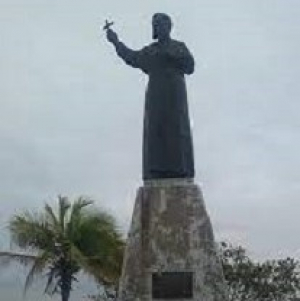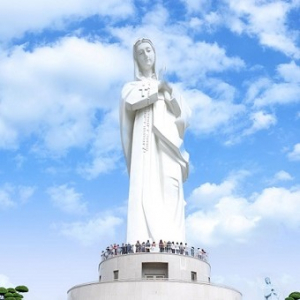Peter MALONE
Johnny
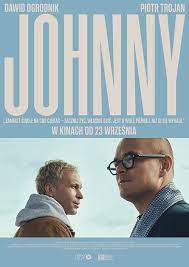
JOHNNY
Poland, 2022, 120 minutes, Colour.
Dawid Ogrodnik, Piotr Trojan.
Directed by Daniel Jaroszek.
Johnny, with the very English diminutive, is a film from Poland. And, perhaps surprisingly in the 2020s, rather genial film about a priest. (There have been a number of Polish films concerning priests in more recent years, some strong dramas, worth checking: Kler, In the Name of…, Corpus Christi which raise most interesting questions for discussion.)
Johnny is the diminutive nickname for Father Jan Kaczkowski (1977-2016).
We are introduced to him by a voice-over – and the voice-over later being revealed is that of Patryk, a petty thief, from a dysfunctional criminal household, who is caught after a home invasion and sentenced to jail (with the information that his first jail sentence was at the age of 12, his father being very proud of it). He is sentenced to community service and released from jail.
And this is where Johnny comes in. He is in charge of a hospice, a range of elderly patients. Johnny is 37, had ailments from birth, walks with a limp, has very poor eyesight (and his driving actually terrorises Patryk at times), and it emerges that he has brain cancer. He has an unusual manner, sometimes abrupt, direct, but extraordinarily kindly attitude, winning over most people, even appearing on a TV show and discussing work with the ill and dying, not telling them that all will be okay but rather accompanying them.
In fact, there are some very moving sequences with some of those at the hospice, a young dying woman leaving a video message for her son when he is 18, a very old man with Johnny close to him, talking, whispering, consoling, encouraging him as he dies, and an elderly woman, initially cantankerous, who had wanted an acting career. And Johnny gets on well with the volunteers at the hospice.
So, this is Johnny’s story and a tribute, seeing him with his family, seeing him at work, always wearing his cassock, seeing him celebrating Mass, seeing him sit quietly praying, seeing him on TV, seeing him on stage at an enormous rally.
But, this is also Patryk story, his encounter with Johnny (Jan inviting Patryk to call him Johnny), initially not reliable, ducking off to bars and snorting cocaine, finding working with the elderly offputting, smelly, but, with Johnny’s encouragement, gradually learning, doing the chores, taking an interest in the patients, assisting with recording the ill mother, sharing the death experience of the elderly man, told off by the woman but then becoming very friendly with her, stunned at her death. And Johnny encourages him to work in the kitchen where he has a particular talent.
The story is not all smiles and niceness. Criminals are still after Patryk and beat him up. But, there is a nice twist when the leading thug finds that his father has to go to the hospice. And then Patryk has to go back to court, a tough judge, Johnny’s heartfelt testimony, but a reaffirmation of the sentence. And, there is an Archbishop who does not approve of Johnny and the hospice, told off quietly but directly by Johnny, but helping in Patryk’s sentence.
And, pleasingly, there are sequences at the end with the actual Father Jan as well is with Patryk, his wife and children.
It is a surprise to find a film with such sympathy towards a priest in these very difficult times for the Catholic Church.
- A biography of the actual Father Jan Kaczkowski? A portrait of the actual Patryk? The impact of the final sequences of them both in real life?
- Poland in the 2010s, the city, homes, church, liturgies, television stations, outdoor festivals, the hospice, rooms, corridors? Authentic atmosphere? Musical score?
- The title, Father Jan, the nickname Johnny, his inviting Patryk to use it? Audience response to him as Johnny?
- Jan and his background, the scenes with his mother and father, at home, sister and brother, their joking with him? His disabilities, poor eyesight, his limp? The doctors, the diagnosis, brain cancer and its effect? His appearance, bold, classes, limp, always wearing his cassock?
- Jan at Mass, the comments of the congregation, the home owner and his rushing out, the thieves trashing his house, chasing Patryk, tackling him? Patryk, sentenced to jail?
- The audience realising that it was Patryk narrating the story, his perspective on Jan, his perspective on himself, his journey with Jan?
- Jan, his work in the hospice, the interactions with the Archbishop, the Archbishop’s criticisms of him, the later meeting, Jan speaking frankly of the Archbishop’s land ownerships and his alcoholism? The later indication that the Archbishop helped in Patryk’s lessening of sentence?
- Patryk, jail, tough, first-time at age 12, his father proud of him, with the big criminals in the cell? Saying respect was important? His red letter, the 365 days of community service, the meeting with Jan?
- Jan, his manner, direct, sometimes abrupt, yet empathetic? With the volunteers at the hospice? The pressures on them? The Archbishop not approving of the hospice? Those in the aged care, Roman, playing chess, his age, his absent son (and Patryk’s later attempt to get the son to visit his father, and the son arriving after the father’s death)? The old man and the assistance at his dying, Jan constant, praying, talking, affirming him? A personalised assisted dying? The young woman, her son, Patryk holding the phone up so that she could record a message for her son? Hania, cranky, critical of Patryk, the blanket, his knocking the door, returning, her smile, the gradual friendship, spending time with her, the gift of the ring, reading the texts, helping with his pronunciations? His sadness in sitting with her, her death?
- The screenplay device of moving backwards and forwards within a sequence, seeing the consequences, and then going back? The effect and understanding better characters and situations?
- Patryk, his character, visits to his family, drunken father, abused mother? The gangs, his owing money to Pablo, trying to escape him, Pablo coming in bashing him? And the irony of Pablo’s father being in the hospice and a truce?
- The film tracing the relationship between Jan and Patryk, Patryk being affirmed, challenged, finishing jobs, yet his wanting to go to the club, the cocaine, the pot? And Jan trying it out? His gradual change, revulsion at the smell of the patients, gradually supporting them, the challenged by Roman to buy stuff and Patryk coming back with change, disproving Roman’s theory?
- Cooking, making the cakes for Hania, Jan sending him to the kitchen, the experiments with poaching the eggs, his cooking skills, working the kitchen, the friendly but bossy cook, the possibility of his becoming a chef, Jan enrolling him in the course, his failing for the interview with the restaurant? Jan upset, Patryk upset, the reason?
- Meeting Zaneta, volunteer, the attraction, together, his proposal, her reaction, the ring?
- Going back to court, Jan and his testimony, moving, the judge not believing it, the sentence? Without parole? Zaneta, coming to visit Patryk in prison?
- Jan, the television interviews, his audience, his words about death, not saying everything would be okay but working and being with people? The talk at the festival and the acclaim?
- Jan deteriorating, Patryk released, Zaneta pregnant, the family with Jan, the sadness, Patryk with him, Jan’s death?
- Jan as a good priest, traditional, yet pastoral, empathy, a wounded healer?
- The final glimpses of the actual Jan, and the actual Patryk and Zaneta with their children?
Unforgivable, The/ 2021
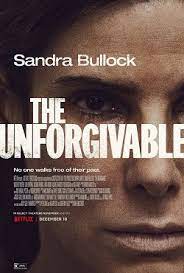
THE UNFORGIVABLE
US, 2021, 112 minutes, Colour.
Sandra Bullock, Viola Davis, Vincent D'Onofrio, Jon Bernthal, Richard Thomas, Linda Emond, Aisling Franciosa, Emma Nelson, Will Pullen, Tom Guiry, Jessica McLeod, Rob Morgan.
Directed by Nora Fingscheidt.
This is an American drama with several strong plotlines, some intense characters, interconnections and an arresting final twist.
It is based on a television series, The Unforgiven. The Unforgivable seems a better title because the person who is not being forgiven has shot a police officer on duty.
She is Ruth Slater, a strong role for Sandra Bullock in middle age. She has confessed to the crime so there seems to be no mystery at all. And she has served 20 years in prison, getting out as the film opens. She has become rather hardened by her experience, seems to have no future prospects except the search for her sister who was five years old at the time of the shooting. Ruth experiences a variety of flashbacks throughout the film, building up the situation about her family, her father’s suicide, her bringing up the little sister, the resistance to moving out of the family home leading to the death of the sheriff.
Ruth is under supervision by her strong-minded but sympathetic parole officer, Rob Morgan. She has to live in a hostel, in a room with three hard women. She has refused a carpentry job (her professional talent) because of her crime. She does find work in a salmon factory, and a part-time job in carpentry constructing a centre for the homeless. But, she is intent on finding her sister even though the law has forbidden this. We have a certain sympathy for Ruth but she is off-putting because of her hard attitudes.
In the meantime, we see the sister, Katie (Aisling Franciosa from The Nightingale), a talented pianist, adopted by a sympathetic couple, played by Richard Thomas and Linda Emond, who have not told her the truth. We also see Katie’s flashbacks, glimpses of the fatal events. Katie is good friends with the couple’s daughter, Emily (Emma Nelson). Clearly, the search will be one of the main themes.
However, as suggested earlier, this is a strong drama and introduces two further themes. The first concerns the two, now-adult, sons of the deceased sheriff. The older is angry and wants vengeance, shocked that Ruth is allowed to live an ordinary life. The younger brother is resistant, contrives to meet Ruth, but becomes bitter (aggravated by domestic difficulties with his wife). The other theme opens when Ruth goes back to look at the family home, encounters a new owner, a lawyer played by Vincent D’Onofrio, whom she tries to persuade to search for her sister. There is a powerful seen when Ruth eventually meets the couple with disastrous consequences The lawyer’s wife, played by Viola Davis, has a hard and harsh attitude towards Ruth – but, in a moving sequence, is forced to listen to Ruth and think about what has happened to her.
All the themes begin to converge at the end, potential for violence, potential for Ruth to see her sister, vengeance for the sins of the deceased sheriff and an unexpected twist
Strong plot, strong cast, interesting drama – and some final tears.
- The title, unforgivable rather than unforgiven? Ruth Slater as unforgivable?
- The American town, settings, the home and the surrounding fields, the American city, streets, buildings, hostels, salmon factory, production, school, piano performance, the docks and warehouses? The musical score?
- Sandra Bullock as Ruth Slater, strong character, not glamorous? The procedure of getting out of jail, her parole officer and the talks, limitations on her activities? Not to seek for her sister? No contact with the family of the deceased sheriff? Going to the hostel, the room, four bunks, the women with problems, going through her possessions? Angers?
- The job interview, her skill in carpentry, her being refused because of her conviction? The job with the salmon factory? The building site, the discussions with the constructor, her skill, stabilising the construction? Getting a job with construction, her skills?
- The flashbacks, the establishing of what happened, the suicide of the father, the mother dead in giving birth to Katie, Ruth looking after her sister, schooling her? The eviction notice – but with the offer of a home? Ruth’s resistance, the gun, the threats, the sheriff, the shooting, his death, her giving herself up, admitting that she had shot the sheriff, conviction and jail?
- Katie, her age, adopted by the family, their concern for her, parenting, Emily as her sister, bonding with her? The initial accident, Katie distracted driving, the crash, going to hospital? Her concern about her rehearsal, performance, piano? The scenes of her playing? Katie’s memories of the events, blurred? The memory of the piano notes on her arm?
- Ruth, the routines of life, the friendship with Blake, tentative, sharing meals, going out, the discussions? The possibility of bonding? The truth, his shock? The repercussions, his blurting out to others, the wife of the police officer and her bashing Ruth? Blake and his admission that he had served time, attempted reconciliation?
- Ruth going to the house, looking at it, John coming out, inviting her in, the suspicion of Liz, the scenes with their children? Ruth and her explanations, the carpentry? John giving her the lift to the station, his being a lawyer, her asking him to help?
- John, in his office, googling Ruth, discovering the truth, his hesitation? Her phone calls and insistence? His sympathy towards her? The approach to the adoptive parents, hesitation, decision to go? The failure of the meeting, the father and his anger, the mother and her not having destroyed Ruth’s letters to Katie, Ruth’s violent outburst? The couple walking out?
- The irony of Emily overhearing her parents about going to see the lawyer, finding the letters, reading them? Making an appointment to meet Ruth, the discussions, sympathy?
- The Whelan brothers, the older brother, his bitterness, memories, stalking Ruth? Talking to the younger brother, his not remembering his father, not motivated to get revenge? The older brother’s resentment at her ordinary life and freedom? Steve, his relationship with his wife and child, tentative, his taking the opportunity to meet Ruth, by accident? Her comment that life goes on and his reaction to this? Discovering his wife’s infidelity with his brother, bitterness, setting up a revenge, to destroy Ruth’s sister, the irony of his seeing Emily with Ruth, assuming she was Katie, abducting her, tying her up?
- Ruth, the continued discussions with the parole officer, his advice, the information that Katie was to play at the auditorium, getting the permission to go?
- Going back to the house, Liz and her hostility, Ruth telling her story? Liz’s change of attitude, driving Ruth? The message about Katie, Liz calling the police? Liz going into confronts Steve, talking, appealing to him, Emily and her fear? His eventually not killing Ruth? Going out on the police?
- Ruth and her insistence that she had killed the sheriff? Taking the blame, giving herself up? The flashbacks to the reality, her being on the phone, Katie getting the rifle, shooting? With taking the blame for talking about using the rifle? Taking Katie to the diner, the special desert, Katie looking away from the window, eating, Ruth being arrested and taken?
- Emily rescued, her parents present? Katie, seeing Ruth, the embrace?
Some Significant April Days for the Chevalier Family, 2023
Some Significant April Days for the Chevalier Family, 2023
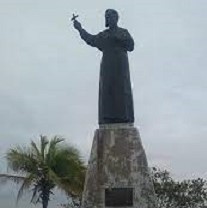
Henri Verius features twice this month
NOTE:
this is an amplified version of Significant Days, combining the list made originally by Cor Novum, Issoudun, now with the addition of dates from Father Jan Bovenmars MSC’s book, Jules Chevalier, Daily Readings. His book was published in 1993 – so, more recent just from all around the congregation and the Chevalier family would be most welcome.
26 new Significant Days have been added.
April 2, 1867
The first student for the Apostolic School, Lucien Cottin, arrives it is again. He brings “588 sous (pennies) from 588 people.) He later became a Jesuit, founded the mission of the Levant in Lebanon on.
3 April, 1857
First meeting of the "Oeuvre des Campagnes" ("Work of the Countryside") arranged by Father Vandel, held in the house of Madam de la Rochejaquelin. This was a social and spiritual outreach to diocesan priests working in isolated areas. This groups continues to the present day, and meets in Issoudun once a year.
4 April, 1928
Definitive approval of the Constitutions of the Daughters of Our Lady of the Sacred Heart.
5 April, 1925
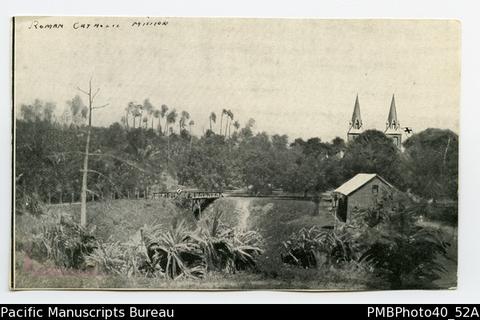
Arrival of the first three MSC Sisters from Hiltrup, in Vunapope (PNG), after World War I.
6 April, 1864
Bishop de la Tour d'Auvergne (of Bourges) presents the Statutes of the Fraternity of Our Lady of the Sacred Heart in Issoudun and signs as first member. To make membership in the Fraternity possible for everyone,
Father Chevalier stipulates that the only requirement is to pray daily: "Our Lady of the Sacred Heart pray for us".
6 April, 1904
Death of the first Superior General of the MSC Sisters, Sister Servatia Rath, Congregation of the Sisters of Divine Providence.
6 April, 1982

The two General Councils of the MSC and the FDNSC meet together for the first time. They approve the transfer of the remains of Mother Marie Louise Hartzer from the Crypt of the Motherhouse to that of the Issoudun Basilica.
7 April, 1872
Official installation of Father Chevalier as parish priest of St. Cyr parish, in Issoudun.
7 April, 1882
Brother William Neenan MSC (Ireland), dies in Rome on Good Friday.
7 April, 1892
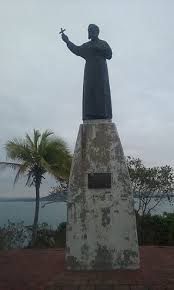
Bishop Verius leaves Yule island for France. He will not see the mission again.
7 April, 1949.
Father Harry Reid, Australia, given mandate by Provincial Council to examine the possibility of an MSC Mission in Japan.
8 April, 1850
Jules Chevalier is ordained sub-deacon in the seminary chapel in Bourges. "On the very day of his ordination, he showed himself completely renewed, from silent and severe to affable and gentle." (Piperon)
9 April, 1866
Fathers Chevalier and Vandel planned the foundation of an "apostolic" school, which did officially open in Chezal-Benoît on 10 October the following year, about 17 kilometers from Issoudun.
This was an apostolic school for boys interested in becoming missionaries in the MSC's. In order to meet the cost of this work, an appeal was made to give a a penny a year - thus the name the "Petite Oeuvre" (the "Little Work").
10 April, 1921
Fr. P.Benedetti (Italy), appointed Apostolic Delegate for Cuba and Porto Rico, ordained Bishop at Lungotevere, Rome
11 April, 1868
The Chapel of Our Lady of the Sacred Heart is opened in Issoudun.
12 April, 2012
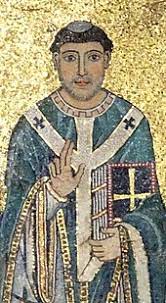
Feast of Saint Jules, (Pope Jules I, who protected Saint Athanasius from the Arians), name day of Father Founder.
12 April, 1914
First Provincial Chapter of the Australian FDNSC Province.
13 April, 1927
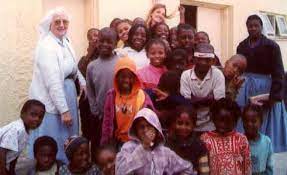
First MSC Sisters leave Hiltrup for South West Africa.
13 April, 1937
The prefecture of Celebes, Indonesia, divided into the Prefecture of Manado, entrusted to the MSC (since 1919) and the Prefecture of Makassar, entrusted to CICM
15 April, 1895
A decree from Rome from orders the replacement of the original statue of OLSH with a new one, but an exception is made for the statue in the Basilica of Issoudun.
16 April, 1881
Chevalier accepts the two Vicariates of Melanesia and Micronesia offered by the Congregation of the propagation of the Faith.
17 April, 1872
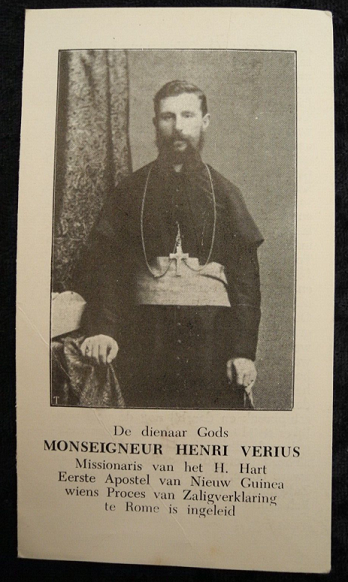
From an ebay ad for relics
Henri Verius enters the petite oeuvre at Chezal Benoit.
17 April, 1909
Canonical direction of the first MSC house in Cork, Ireland. Father Michael Tierney is the first pro-Superior.
18 April, 1895
Parish of Botany, Australia, given to the MSC.
19 April, 1877
V.Casas, first Spanish novice for vows, together with French companions, including Ferdinand Hartzer.
20 April, 1876
First mission departure ceremony in MSC history:
Father Durin and two scholastics are sent from Issoudun to Watertown, in New York State, USA. They arrive in Watertown on 6 May, 1876.
The previous General of the MSC's, Father Mark McDonald, was from Watertown!
20 April, 1895,
First Belgian MSC, Fr. Joseph Lebeau, leaves for the Gilbert Islands mission, Kiribati.
21 April, 1961
Appointment of Father Joseph Weigel MSC (South German Province, first Bishop of the Kayla (as a year)
22 April, 1932
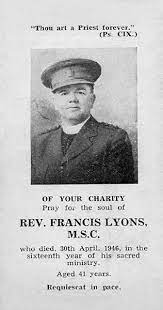
Father Frank Lyons, Australia, takes up residence for the first time at Sideia, Eastern Papua.
23 April, 1906.
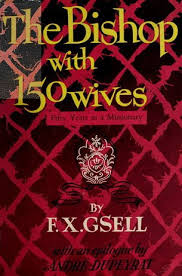
Fr F.X Gsell is appointed Apostolic Administrator of Victoria-Palmerston, later called Darwin, Australia.
24 April, 1879
Canonical erection of the first MSC House in Rome, at Piazza Navona.
25 April, 1882
Fr Piperon buys an empty factory at Veldhoven, Tilburg, Netherlands, to transform it into a house of formation.
25 April, 1932,
Direction of the Apostolic Prefecture of Purwokerto, Indonesia, entrusted to the Dutch MSC, Fr. B.Visser being its first Prefect.
25 April, 1933
Fr Ed van Goethem appointed Apostolic Vicar of Coquilhatville, Belgian Congo, Zaire, ordained Bishop.
26 April, 1877
Father Jean Marie Vandel, founder of the Apostolic Schools, dies in Issoudun. Chevalier said of him: "His life ... is that of a saint."
26 April, 1879
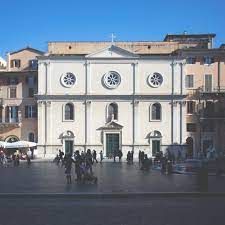
The Archconfraternity of Our Lady of the Sacred Heart Directed in Rome, August 5, 1873, transferred to the MSC church in Piazza Navona.
27 April, 1960
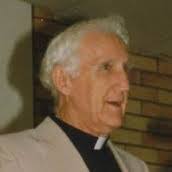
Fr. Virgil Copas, Australia, appointed first Vicar Apostolic of Port Moresby, Papua New Guinea, ordained Bishop in Toowoomba.
28 April, 1975
The name of the Sideia/Samurai diocese, Papua New Guinea, change to the diocese of Alotau.
28 April, 1988
The Central Pacific Region of the PNG Pro-Province becomes the MSC Pacific Union.
28 April, 1988
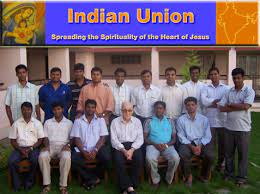
Canonical erection of religious house for MSC in India in the Vivekanagar suburb of Bangalore, directly under the General Superior.
29 April, 1839
Birth of Victor Jouet at Nuoro, Sardegna, Italy. “Tell me: who has worked as much for the success of our works?” – Father Chevalier to father gi oh, 28 January 1891.
30 April, 1907
Sale by auction of the confiscated property of the MSC and FDNSC in Issoudun. Count de Bonneval buys the MSC property for 100,000 francs; ten minutes later Madame de Lapparent buys the house of the Sisters for 40,000. The property is thus saved for both the MSC and FDNSC.
Our Lady of Nui Cui Pilgrimage – celebrating MSC 20 years in Vietnam
Our Lady of Nui Cui Pilgrimage – celebrating MSC 20 years in Vietnam
(By Communication Committee)

On the feast of the Annunciation of Mary, the MSC family in Vietnam commemorated 20 years of presence in Vietnam with a pilgrimage to Our Lady of Nui Cui as the process of preparation for the 20th anniversary. There were around 90 of us as MSC family: MSC brothers, sisters, OLSH, lays, friends, benefactors, brothers’ parents, students, … We really felt an atmosphere of gratitude, true family, unity, joy, and confidence together. We gave thanks to Our Mother for the graces and accompaniment the MSC family received in the last 20 years.

The journey from Sai Gon to Dong Nai province took almost 2 hours by bus, but it was a joyful and grateful experience. Upon arrival at Our Lady of Nui Cui, we offered songs and prayers to Mary, followed by a mass. In his homily, Father Minh reminded us of the blessings the MSC family received through the intercession of Mother Mary during the last years. He also invited us to live in gratitude, joy, and to imitate Mother Mary by saying “yes” to the plans that God has for us. During the mass, the MSC sisters also celebrated their 123rd foundation anniversary. It was a miraculous blessing for the MSC family, especially for the MSC sisters. We are supposed to start the Chevalier Year on March 15th, but we combine in this Pilgrimage with all the presence of MSC family in Vietnam.

After the mass, we had a warm lunch together prepared by the friends of our friends.

On the way back to Saigon, we visited the tomb of Father Joseph Thanh, OP who was murdered while listening to confession. They prayed for his soul and asked for his intercession for their physical and spiritual journey. The pilgrimage ended joyfully, with hearts full of happiness and grace.
This was an amazing gathering as our preparation for the big event. May Our Mother of Sacred Heart continue to look upon all of us, esp. young Vietnam MSC community, so that we are always united in joy, love and confidence, esp. at those moments of challenges and difficulties.
May the Sacred Heart of Jesus be loved everywhere!

Of an Age
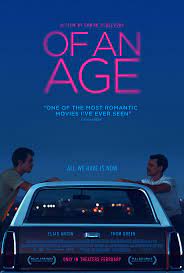
OF AN AGE
Australia, 2022, 100 minutes, Colour.
Elias Anton, Thom Green, Hattie Hook.
Directed by Goran Stolevski.
Of an Age has received quite some critical acclaim. It was written and directed by Goran Stolevski, born in North Macedonia, coming to Australia as a teenager, arts and studies in Melbourne, making several short films and contributing to the television series, Nowhere Boys. He made his first full-length film in Macedonia, Macedonian language, You are not Alone.
However, Of an Age is set in the Melbourne that the director knows. There are several mentions that the central characters went to school at Watsonia High. There are references to Greensborough and Bundoora and a drive to Altona. So, this drama is strongly embedded in the suburbs of Melbourne, some leafy, some industrial. The film has atmosphere.
The film has two time eras. The first half of the film is set in 1999. Then there is a transition to 2010. The action in both time spans takes in 24 hours each.
What is distinctive about the style of the film is its constant use of close-ups, extreme close-ups, especially of faces, profiles. We are introduced to the central characters and stay with them. Faces and body language are a key to the themes of the film and what is going on in each character.
In 1999, Kol, his family from Macedonia, is set to participate in competitive dance finals, glimpses of him and his dancing routines. However, his partner in dance and friend, Ebony, has had a heavy night, is lying on the beach at Altona the tide coming in, desperate, phoning, tantrums and self-righteous, demanding that Kol contact her brother, Adam, to come and pick her up. Then we spend some time with the three of them, inside Adam’s car.
Kol is very serious, played by Elias Anton, looking older than the 18 he is supposed to be. (However, he looks much more credible in 2010 at 30, though at the time of filming he was 23.) Adam is played by Thom Green, sympathetic, more than patient with Ebony (Hattie Hook), just out of a relationship with his boyfriend. Which introduces the sexual orientation theme.
The rest of the day is long for both Kol and Adam, at Ebony and Adam’s house, Kol going home and family and friends watching the football, invited out to a party, talking with Adam, a sexual encounter in his car. And then the transition to 2010.
A great deal has happened to each of the characters in the meantime, Adam was going to South America to complete PhD studies. We find that Kol has gone to Europe. They meet at the airport, both coming home for Ebony’s wedding. Each is tentative, a great deal happening in 11 years, changes. Most of the action takes place at the wedding, Kol finally dancing with Ebony with style, tension with Adam, talking, realisation of the bonds between them – and audiences left to make up their own minds as to what decisions will be made.
The characters are very sympathetic (but not Ebony) inviting audiences to share their lives and feelings.
- The title? Kol and his age, Australian society, 1999, 2010, social attitudes, gay orientation?
- The Melbourne settings, the suburbs, named, Watsonia and Watsonia High, Greensborough, Bundoora, the trip to Altona? The suburban landscapes, industrial, homes? The musical score?
- The structure of the film, the anguished opening with Kol? 1999, the action taking place over 24 hours? The transition to 2010, the action taking place over a day? The effect for the audience, immersed in 1999, appreciating the characters, relationship, discoveries? Taking the gap of 11 years? The characters meeting again – and the ending left to the audience wishes and decisions?
- The visual style, the use of close-ups, some extreme close-ups, focus on faces, profiles? 1999 and the long car journey and faces? Opening up in 2001, the airport, the drive, the family home, the wedding reception, the dance?
- Kol and his story, age, approaching 19, friendship with Ebony, dancing together, at home, his mother working hard, his younger brother, the phone, the uncle? The society of family, watching the football? At home, yet alienation? His dance skills, seeing him rehearsing, his clothes, the finals?
- The introduction to Ebony, on the beach, the tide coming in, bewilderment, the phone, asking the mother and child recording, phoning Kol, desperate, incoherent, demanding, self-righteous? The urge to contact Adam? Waiting, their arrival, continuing her tantrums in the car? Not caring about the finals? Wanting to get into NIDA, Macbeth, the quotes, the revelation that she had not got in? The encounter at the cafe, Kol, the invitation to the party? Her going, her carrying on? Inviting Kol?
- Adam, his place in the family, a broken partnership, the videos in the box, meeting Kol, the talk in driving to Altona, Kol and the finals, the map? Adam and his studies, linguist, Spanish, Kol reading Borges, Adam and his PhD, going to South America? The bonding between them? The return to the family home, the change of clothes, each responding to the other? Kol and the farewell after the family dinner before Adam’s departure, the phone call, going to the party, at the party? Going to the hill, the kiss, the sexual episode in the car?
- The transition to 2010, airport, Kol and his change in appearance, looking more his age, the two seeing each other, tensions, embrace, the lift, the prospect of Ebony’s wedding? Tentative talking between the two? At the family home?
- The wedding, the ceremony, the bride and groom and the dancing (and Kol seeing the groom in the bathroom and the woman coming out)? Avoiding Adam? Adam, observing?: The conversation with the young woman? The decision to dance, dancing with Ebony? Then leaving? Adam following him, the talk, Adam and his history, the issue of gay marriage and Adam marrying in New York?
- The ending, Adam following coal, Kol stopping, the embrace – and the audience speculating about the relationship and the decisions of each?
Simone, Voyage de Siecle/ Simone Woman of the Century
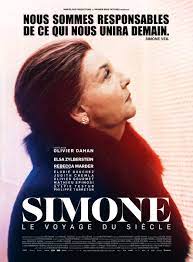
SIMONE, WOMAN OF THE CENTURY/ SIMONE, VOYAGE DE SIECLE
France, 2022, 140 minutes, Colour.
Elsa Sylberstein, Rebecca Marder, Elodie Bouchez, Olivier Gourmet, Mathieu Spinosi, Sylvie Testament, Philippe Torreton.
Directed by Olivier Dahan.
Simone Veil was a significant French personality of the 20th century, a significant European personality. (She is not to be confused with the philosopher-mystic, Simone Weil.)
This is both biography and portrait. It has been written and directed by Olivier Dahan who had great success with his biography of Edith Piaf (and Oscar-winning performance by Marion Cotillard) but much less success with his biography of Grace Kelly, Princess of Monaco (played by Nicole Kidman). Here he is very successful in communicating the person and career of Simone Veil.
The storytelling is not straightforward or linear (some audiences complaining of confusion). However, with its running time, the audience has to be alert and will be rewarded as they watch various time phases of Simone Veil’s life juxtaposed with others, each making thematic comments on the other.
Simone is played older by Elsa Zylberstein, younger by Rebecca Marder, both very convincing.
The film does open in the 1930s, a Jewish family, a devoted mother with four daughters, Simone the youngest, bookish and eager for storytelling and songs at a young age. However, World War II breaks out, the rounding up of Jews in France, the experience of Auschwitz and other concentration camps.
We may be rightly expecting some detail about the concentration camps at this early stage of the film but, the information is verbal. However, much later in the film, and to much more dramatic effect, a great deal of time is given to the war experience, the family experience, Simone’s being arrested, then the family taken.
Rather, the film goes to 1946, post-war, Simone and her studies, her marriage to Antoine, the beginnings of a family, his being posted to Stuttgart and her reluctance to go to work in Germany but her liking it there. There is also a drama of her sister, Milou, with whom she strongly bonded in the past, in the camps, but Simone being affected deeply by the death of her sister in a car accident.
The film then pursues her studies, Antoine hesitant at first, legal studies, her applying to be a magistrate. And she has great success with her work in the 1950s and the early 1960s, visiting prisons, hostile reception from wardens and staff, the visualising of the appalling conditions of prisoners, health problems, and the compounding of these with the war in Algeria. Despite some misogynistic attitudes by authorities, she achieves her aims.
In the meantime, the film has introduced Simone, older, with children and grandchildren and her husband, writing her memoirs.
For Europeans, the scenes of her work in the French government, as Minister for Health over many years, her decision to stand for the European Parliament, her concern for what was to become the European Union and his support of it, and her becoming the first president, are reminders (or information for those not aware of it) of her successful political career.
And it is in this context that we have the long sequences of World War II, much lengthier than we might have expected, the crowded trains, the separation of prisoners, life in the hearts, the hard work, deaths, scrounging for food, the help of a kindly Kapo, the advance of the Russians, the SS retreating, the death march, and the two sisters all the time caring for their ailing mother. Most powerful. And this is reinforced by the invitation for Simone to come with her family to Auschwitz for the 60th anniversary of the liberation, her going, and walking through the remains of the camp.
Important for French audiences, for European audiences, an informative and engaging for worldwide audiences.
- Audience knowledge of Simone Veil, life, career, influence? French audiences? International audiences?
- A biographical portrait? Narrative, emphases, activities? Relationships? Jewish background, secular background, French background?
- The work of the director, biographies? His screenplay? The structure of the film, the linear aspect, the moving around in time, different times and memories, influences, Simonee writing her biography, remembering? The effect on the audience, different times influencing memories of other times?
- The background, the family, the 1930s, Jewish, parents, secular Jews, no religious instruction, commitment to France? The father, the difficulty of registering as Jews? The mother, the bonds with her daughters, Simone, bookish, wanting stories, songs? Her relationship with her other sisters?
- Early in the film, the 1974 abortion legislation, seeing her in action, speeches, negotiations, principles, backyard abortions, support from the Catholics even though condemning abortions as such, the achievement in legislation? This sequence influencing perspectives on the rest of Simone’s story?
- The arrest, her arrest, her parents taken, Auschwitz and the other camps? The fact that this was not visualised early in the film but shown extensively later, the arrest, fleeing the Germans in the streets, the packed train carriage, the long journey, deaths, babies need in water, impossible to sit? The arrival, the separations? The treatment by the soldiers, the guards? The huts, hunger, fighting for food? Work? The two sisters looking after their mother? Wanting to find a spoon, the gift of the dresses? Work, standing in the rain? The kindly Kapo, the transfer to the other camp, Simone and her manual work, the arrival of the Russians, the SS and the departures, the death march, Milou and her caring for her mother, Simone and her mother, her mother’s death?
- The move to 1946, Simone and her age, the encounter with Antoine, the families, discussions, his work, studies, her graduation, science background, wanting to do more, ambitions to be a lawyer? The marriage, her pregnancies? The joy of the children? Milou, the bonds, their talking throughout the story? Denise, her background, interrogations, later meeting with Simone?
- The move to Germany, Milou not wanting her to go, the atmosphere of Germany, Stuttgart, Simone and finding Germany congenial, the music, the work, the travel, supporting Antoine? The children? The visit of me Lou and her husband, the baby, the tragic news of the accident, their hurrying, the husband and child surviving? Milou’s death?
- Simone, interviews, reticence, her story and her writing, the television crews, the flashbacks within the context of these television interviews?
- Her role as Minister of Health, for so many years, the 1980s and AIDS, her visit to the patient, her demands, the emaciated man, weeping, wanting an authentic role?
- Wanting to be a magistrate, Antoine’s objections, her studies, the interviews, her becoming a magistrate? Discussions with government officials, the sexism, her being listened to, convictions, the visits to prisons, the men, the appalling conditions, health and illness, the clashes with the prison administrators, the war in Algeria, her visit, the women prisoners, the amputated 16-year-old woman? Her achievement in reforms?
- Her continued work, the effect on family, her sons, her absences, but their being proud of her?
- The European Parliament, her standing, the campaigning, meeting people, the setting of the Parliament, her election as President, the speech? The years, her influence and change? Her belief in the European Community?
- The scenes in old age, Antoine and Simone, comfortable together, the children, grandchildren?
- The insertion of the Holocaust sequences later in the film, the effect?
- 2005, the 60th anniversary of Auschwitz, a decision whether to go or not, Antoine and his decision, the other children, the travel, her walking through the camp, and again the insertion of memories?
- Questions about her religion, her secular beliefs, the nobility of committed secularism?
- A significant woman in European history of the 20th century? The audience sharing her voyage?
Lost Illusions
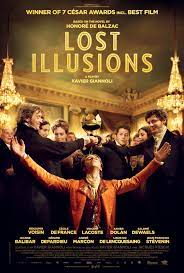
LOST ILLUSIONS
France, 2021, 150 minutes, Colour.
Benjamin Voisin, Cecile de France, Vincent Lacoste, Xavier Dolan, Salome Dewaels Jeanne Balibar, Andre Marcon, Gerard Depardieu, Jean-François Stevenin.
Directed by Xavier Giannoli.
Lost illusions is a period drama based on part of a novel by Andre to Balzac. It has a significant cast of French actors, leads and supporting, along with Canadian writer-director, Xavier Dolan.
There is greater attention to the period, after the Napoleonic wars, the re-establishment of the monarchy in France, especially during the 1820s. And, great attention to costumes and decor.
The film opens in the French countryside, the poor, the workers, a printing factory, and the mansions of the aristocracy. Then the film moves to Paris, again with the aristocracy and socials, with the more impoverished and their apartments, and a focus on the small magazines, the newspapers, the printing presses.
The focal character of the film is Lucien, played by Benjamin was in, a combination of a poetic visionary and man of ambitions, especially wanting the title of his aristocratic mother rather than the ordinary surname of his father. And he works at the printing press. Write poems, sits in the countryside contemplating. Is also in a relationship with a local Countess, played by Cecile de France. They both go to Paris.
This is a story of rise and fall, the ambitious young man thinking he can conquer Paris, but finding reality. He is befriended by a journalist, played by Vincent Lacoste, who introduces him to the world of journalism.
And, this is where Lost Illusions is quite contemporary in its themes despite the 19th century decor and costumes. There is cynicism in the journalism, the small magazines, ambitions, rivalries, paid for reviews of books and plays, the highest bidder, the move towards fake news. In these aspects, the film is quite arresting, a kind of 19th-century mirror of contemporary news on social media issues.
There are romantic complications, the hypocrisy of the aristocracy in seeming to support the young man and then unmask him, humiliate him. He befriends a young prostitute who has ambitions for acting, to perform are seen on the Paris stage, is supported, is undermined – by an especially sinister character who is in the pay of theatre producers, hires audiences, gets into applaud or his according to the highest payment he receives.
The film is interesting with Gerard Depardieu as the editor of a book company, not a reader, but able to exploit situations. There is some humanity in another character, a writer, whom Lucien admires, played by Xavier Dolan.
The film shows the moral decline of Lucien, his drinking, his continued infatuation with the Countess, his gambling – and the humiliations by his fellow journalists.
He returns to his country hundred, strips, walks into the lake – and the audience is left to ponder whether he is equivalently drowning or his being washed clean, a kind of baptism for a new life.
- The reputation of De Balzac, 19th-century, French literature? 21st-century interpretation?
- 1815 to 1830, France, after the revolution, after the Napoleonic wars and Napoleon’s defeat, restoration of the monarchy, French society, change, the new century?
- The period, costumes and decor, homes, mansions, present society, printing works, editorial offices, government, theatre, an atmosphere of change? The musical score?
- Paris, alive, yet the critique of society, decadence, hypocrisy?
- Lucien’s story, his background, father and name, mother and title, his family, age, in the countryside, contemplating, poetry, printing, his poems? Prospects? Pride? The encounter with Louise, her patronage, the relationship, the dedication of the problems, the gift of the book, her husband and her estrangement, the social visit, his name, his being mocked, reading the poem, the applause, slight, the husband and his insults?
- Lucien, going to Paris, ambitious, finding somewhere to live? Financial difficulties? Jobs? The encounter with Etienne? Etienne as a writer, journalist, taking Lucien under his wing, going to the meetings, the other journalists, the philosophy of journalism, reviewing, exploiting condemnations, financial deals for promotional condemnation? The small papers, the success, amalgamating, the reputations, the readership? In these 19th-century parallels with 21st century journalism and fake news? And social media?
- Lucien, his ideals, but easily bypassing them, his writing the reviews? But his ambitions with his poetry? The reputation of Donaut, editor, finance, deals, is not reading, Lucien meeting him, rejection? Donaut and his clientele, Nathan, his book, publication, reviews? Donaut, changing his mind, meetings with Lucien, publishing the poetry? The portrait of an opportunistic publisher?
- The contrast with Nathan, his befriending Lucien, his character, writing, Lucien attracted, admiring his writing? The commission to criticise his book, Lucien resisting, the meeting with Etienne, the newspaper editor and his plot, to bring down Lucien, Lucien writing anonymously the carve up review, the consequences?
- Lucien, relationship with women, the encounter with Coraline and Florine? Their lives, prostitution, support from wealthy men? The set-ups? Coraline and her hopes for acting, performing Racine? The rehearsals? Her relationship with Lucien, his spending money on her, clothes, accommodation? His gambling, drinking? Her concern, visiting Louise for help?
- The character of Singali, his role with the influential, organising audiences, stacking theatres, the mechanisms for applause or disdain, training the audiences to applaud or hiss? Lucien giving him the money, the promises, the night of Coraline’s performance, the crowds gathering, Louise and the Baron, the Baroness, Etienne? Lucien and his expectations, the crowd turning on Coraline, hissing, projectiles, the disaster of the evening?
- The consequences for Coraline, tuberculosis, her collapse, her death?
- Lucien, the betrayal by Etienne? The mockery of the journalists? His financial situation? The importance of his name, his mother’s name, Louise giving him a contact, the official request for his official name, his articles, the government and its condemnation of him, the refusal?
- Louise, the failure of life in Paris, Lucien and his visit, her leaving the city?
- Nathan, a true friend, support, Lucien betraying his principles in dealing with Nathan?
- Lucien, return home, to the provinces, his stripping, walking into the water, the film ending, the audience deciding what decision he would make, the water a kind of drowning or the water kind of cleansing, a baptism for a new phase of life?
Narvik: Hitler's First Defeat/ Kampen om Narvik
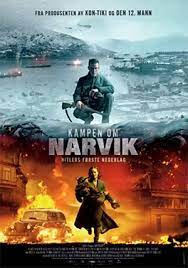
NARVIK: HITLER'S FIRST DEFEAT: KAMPEN OM NARVIK
Norway, 2022, 109 minutes, Colour.
Kristine Hartgen, Carl Martin Eggesbe, Stig Henrik Hoff, Christoph Bach, Billy Campbell.
Directed by Erik Skjoldbjaerg.
The 21st-century opportunity to see something of World War II from a Norwegian perspective.
Over the decades, that been quite a number of films about war action in Norway, the spectacle of The Heroes of Telemark in the 1960s, and, over the decades, a number of films and episodes from Norwegian filmmakers. This is a Norwegian contribution.
The film will be of great interest for those not familiar with these World War II stories, and those not familiar with Norway’s involvement, the initial neutrality, Sweden shipping I and or through Norway to the Port of Narvik, the Germans wanting the iron ore, the British wanting it, the clashes between Germans and British navies, the mining of the Port, the bombardments, the presence of German troops, the neutrality compromised and Norway involved in the war.
The film has several chapters – opening with information about the situation in 1940 and the iron ore, then the introduction of a personal story with which the audience can identify, seeing the events through their experiences. While we are introduced to a young soldier who takes leave to see his wife and young son, the initial chapter focuses on the wife, working in a cafe in Narvik, its being occupied by the German consul and the troops, her skill in languages, both German and English, her being a translator as well as helping the British Consul to hide in a hut in the hills with his radio contact to England. However, civilians are urged to escape and they trek through the snow, along the bridge which is about to be blown up (the team led by the husband) to thwart German advance. The wife and her son have to return to Narvik.
The second chapter focuses on the husband, caught after the dynamiting of the bridge, he and his friends prisoners of war, trudging with supplies through the snow, then invasion by French and Polish troops, their participating and freed, joining a troop which is to mount an attack on the Canon, held in a tunnel, the husband finding a way to destroy the Canon, stopped these bombardments on the town and the Bay, raising the flag on the mountain top.
In the next section, the citizens of Narvik have to take shelter with from the bombardments, the little boy is injured, his wound becoming infected, and the mother asking the consul for a doctor and giving information on the whereabouts of the British. She is then shunned as traitor, complicated when her husband returns, his dilemma about his love for his family and his loyalties.
At the end, information is given about the fate of Narvik, its being destroyed by the German bombardments, and a number of black and white photos showing the reality from 1940.
- 21st-century perspective on always neutrality than involvement in World War II?
- Audience knowledge of Norway’s World War II history? From utility, to attack, occupation?
- The recreation of the town of Narvik, the harbour, streets and buildings, homes, the hotel and interiors? The snow and ice locations? The prisoners of war camp? The Cameron and the attack, the terrain? Musical score?
- The structure of the film, indication of time over two months or more, April-May 1940? The introduction and explanation, the war situation and iron ore and the port, Sweden, the family, the focus on Ingrid and her story, the focus on Gunnar and his being a prisoner, the attack and fighting?
- The information about Sweden, supplying iron ore, for the Nazis, the British stands, the ships, conflicts, mining the harbour, bombardments? The Germans and British in Narvik? The British having to hide? The radio communications? The Germans, taking over the city, dominating the media?
- The focus on the Tofte family, Gunnar, soldier, leave with his wife, birthday, toy train, his son, his father? Getting back late? The troops coming into the town, the confrontation with the Germans, guns on each side, the Major and his intervention, surrender, marching the troops back, over the railway bridge? The decision to blow the bridge? Gunnar and his expertise, the civilians on the train, the timing, the tunnel, the civilians coming back out, being shepherded across the bridge? Ingrid and her son, hiding, captured? The blowing of the bridge? Gunnar climbing the tower, jumping, the three being arrested, prisoners of war?
- The focus on Ingrid, her work at the hotel, languages, German and English, translating for the German consul, his attraction towards her, sympathy? The running of the hotel? Working with Polly? Working with Bjorg? The British Consul, his request for concealment, Ingrid sending Bjorg to hide them in the heart? Her continuing her work? The translations? Concern about her husband, asking the Consul for information? His later showing of the list and Gunnar’s name being crossed off? With her son, with her father, their home?
- The bombardment, the boy being injured, the people in the shelter? The boy and his nightmares? Bleeding? His infection, Ingrid asking the Consul for the doctor, her giving the information about the British, the doctor healing her son? People’s attitudes about her collaboration? Bjorg and her criticism, Ingrid saying she had not implicated Bjorg?
- The prisoners of war, the sleds in the snow, the arrival of the French and the Polish, the attack, Gunnar and his involvement, shooting? The combined forces, the Major, the cannon blasting the ships in the bay, the ascent of the mountain, the return, Gunnar and his alternate route, the attack, shootings, the grenade and the destruction of the cannon? The rejoicing, the raising of the Norwegian flag, singing?
- The Germans, the evacuation, the mayor, the German consul inviting Ingrid to come to Germany with him? Her refusal? Getting her son, packing, the refugees, the denunciations? Gunnar and his return, her telling him the truth, his dismay? Change of heart, on the fishing boats with his family, the evacuation?
- Further information about the war? And the black-and-white photos of the destruction of Narvik?
Survival of Kindness, The
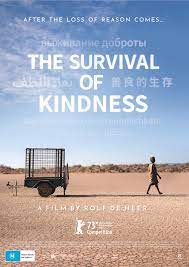
THE SURVIVAL OF KINDNESS
Australia, 2022, 96 minutes, Colour.
Mwajemi Hussein, Deepthi Sharma, Darsan Sharma, Natasha Wanganeen, Gary Waddell.
Directed by Rolf de Heer.
For 20 years, writer-director, Rolf de Heer, has focused on Australian indigenous themes for his films, The Tracker, 10 Canoes, Charlie’s Country… Here is his most ambitious exploration of these themes.
In his commentary, Rolf de Heer notes that he selected locations that corresponded to his imaginings before he wrote the screenplay, adapting the events of his film to what might happen in these locations, from desert, to scrub, to hills, mountains, lakes, ruined stone buildings in the desert, the country town, the city, industrial centres… The desert and like sequences were filmed in South Australia, the mountains in southern Tasmania, especially Mount Wellington. Quite an agenda.
As we watch, we appreciate that this is an Odyssey story, a focus on Blackwoman, initially seen in a locked cage out in the desert – and the audience spends quite a time at the opening of the film gazing at her as she gazes at her belief and open surroundings. As she goes on a trek, after liberating herself, she moves through the countryside and its variations, a surreal experience for her and for the audience.
Blackwoman is played by a first-time performer, Mjawemi Hussein, originally from the Democratic Republic of Congo, use in refugee camp, migrating with her family to Australia, getting degrees and involved in social work. She is in every sequence – carrying the drama of the film.
Her Odyssey leads to her to encounter a range of different people, both dead and alive, in a kind of futuristic society, suffering an illness (and this film was written and made in Covid times), people wearing gas-marks, speaking indecipherable words, a group seen initially with a huge birthday cake, icing with toy soldiers on top, as well as miniatures of indigenous people and a flag – it is they who put Blackwoman in the cage and out into the desert.
And we begin to realise that, in many ways, Blackwoman is revisiting Australia’s past, black woman before invasion and colonisation, the 19th century taking of the lands, the repercussions of suffering and death for aborigines, the building of the towns, and, surprisingly as it develops, a more modern era, vast engineering plants, industry. There are the railyards, the engines, the empty carriage, squatting there? And the contrast with the vast model railway and the exhilaration of watching it?
And, there is a range of characters, a dead gasmasked man buried in sand, Blackwoman appropriating his boots, an old white man, you’ll, cradling his dead aboriginal wife, a screaming woman, an old aboriginal preparing his grave, a colonial museum where Blackwoman borrows clothes, the black man in a cage being taunted by the men in gas masks, and, with more attention, two youngsters who befriend Black-woman and who are helped by her, offering some feeling and humanity, and removing of masks, for some audience relief.
Which means then that as the audience responds, puzzling over the events, making the references to indigenous history, and responding emotionally to Blackwoman and her trek as well as the strange and bizarre events, we are continually challenged to reflect on history, on racism, on violence, on the sins of the past – and what prospects we have for the future.
And, the challenge is still there in the final sequence, the delete Odyssey following Elliott’s line about having our end in our beginning.
A demanding film, certainly not for the impatient, and especially not for those who so often write blogs proclaiming that they are perennially bored.
- The title? Blackwoman, her situation, her Odyssey, her encounter with people, kindness? Her survival – although the final image of the skeleton in the cage?
- The work of Rolf de Heer, writing, directing, interest in aboriginal themes, history, racism, contemporary issues?
- The location photography, the desert spaces, scrub, hills, mountains, lakes, stone ruins, country town, city, industrial areas? The musical score?
- The portrait of Blackwoman, representing indigenous peoples all over the world, in an Australian setting (and the credits in different languages)? Indeterminate age, prejudice and taunting her, in the cage, transported to the desert, locked in, left, days and nights passing, eventually her ingenuity, scrubbing the lock, opening it? A representative Everywoman?
- The trek, real and surreal, issues of water, food, sleep, the desert on foot, finding boots, finding clothes? Looking at the surroundings, decisions on where to go, tracks, hills and views, ruined stone houses, skeletons, the dead gasmasked man in the desert, buried in sand, taking his boots? The frantic woman? The old man, disease, cradling his dead wife, getting water, the exchange for the boots? The change of clothes? The old aboriginal man digging a grave? The black man in the cage and his being taunted? The Museum, the mannequins, taking the clothes (and later returning them)? The deserted country town? The roads, the highways, the more modern roads? Her making the white powder, putting the white around her eyes, wearing the gasmasked, becoming more anonymous?
- The effect on Blackwoman, persevering in her journey, coming to the city, the buildings, the streets, the workplaces, engineering, manufacturing? The scenes of Blackwoman and her work, the factories, the chain around the neck, her getting free, sleeping on the floor, in the workplace?
- The two young people, masked, revealing the mask, her revealing herself, the two youngsters, friendliness, difficulties in communication, the boy and his work, helping, the girl, the tai chi? The boy and the model trains, the exhilaration of the trains? The reality of trains, the rail yard, the engines, the carriage, their living in the carriage? The boy and his illness? Finding the girl in the corner, the wounds, taking her out to the water? Communication, joy, Blackwoman urging her to close her eyes – death?
- Blackwoman, the experience of the Odyssey, her decision to return, the same parts, the museum and clothes, back into the desert, getting into the cage? And the final image of her skeleton?
Redeeming Love
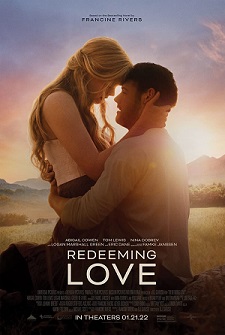
REDEEMING LOVE
US, 2022, 134 minutes, Colour.
Abigail Cowan, Tom Lewis, Logan Marshall-Green, Livi Birch, Famke Janssen, Nina Dobrev, Eric Dane.
Directed by D.J.Caruso.
This film is based on a popular novel by Francine Rivers, who co-wrote the screenplay with the director, D.J.Caruso, his past films include a number of dramatic thrillers.
The film is described as a Christian Western, with an appeal to the faith-film audience. However, with its frank portrayals of brothels and prostitution in the western towns, with the violence of the towns, including a lynching, and some frank portrayals of sexual relationships, there were some complaints from the Christian audiences.
However, the practice has some kind of precedent. The novel and the film based on the Jewish Scriptures, the book of the prophet Hosea. This is the story of the prophet who is inspired by God to go to the pagan temples, choose a temple prostitute, Gomer, and marry her. She is unfaithful to Hosea, runs away, but he is also inspired by God to seek her out, forgive her, bring her back, love her.
So, this is a framework for this story of redeeming love, the prostitute, in a brothel in a Western town of the 1850s, Angel (Abigail Cowan), is young, remembers her violent father abandoning her and her mother who has to turn to prostitution to survive, is ill, tended by her daughter. The brothel is managed by the Duchess (Famke Janssen) and is under the domination of the brutal Duke (Eric Dane). Angel is full of self-loathing, no confidence in herself, and despising her clients – including her father who then commit suicide.
The prophet figure is Michael (Tom Lewis) an upright man, prayerful, visiting church, determined to marry, God-inspired, then seeing Angel, love at first sight, his continual attention to her, her mistaking him for a client, his perseverance. After a violent episode he is able to take her to the farm and restore her – but, over the time, she keeps running away, his seeking her out. Then she is betrayed by Michael’s brother-in-law who violates her.
Back in the town, she encounters Duke, confronts him, and he is pursued by the townspeople and lynched.
Angel changes her ways, works as a waitress, sought out again after years by Michael, returns but, thinking she cannot have children, leaves because she thinks Michael should have a wife who can have a family. She works then helping young prostitutes in the town.
Ultimately, Michael seeks her out again, persevering in the model of the prophet, and winning Angel’s love.
- Biblical, Christian-themed film? Western? Romance? Based on the book of Hosea?
- The California settings, the 1850s, farms, landscapes, towns, streets, stores, hotels, brothels? Church? The musical score?
- The title, with reference to the book of Hosea? Hosea, his love for Gomer, her leaving, his seeking her out, forgiveness, love?
- Angel’s story, her being the Gomer-figure? Working in the brothel, character, age, self-loathing, the clients, even her father and her revenge on him (and his suicide)? The management of the brothel, the control of the Duchess? Flashbacks to Angel’s past, Sarah, little girl, her mother, her father’s betrayal, violence, departure? Her mother, prostitution, destitute, ill, her daughter caring for her? The consequences for Sarah, Duke, buying her, setting her up, as a young girl, as a young adult?
- Michael, the Hosea character, upright, background, family, in-laws, working the farm, determined to marry, going to the town, seeing Angel, love at first sight, his visits to her, her wrong interpretation, his intentions, declarations, his return? Her disbelief?
- The violence, the women, the brothel, her leaving, recovering with Michael, his care for her, respect, sexual respect? Her recovery?
- The biblical pattern for the relationship between Michael and Angel, love, her leaving, His seeking her out again, bringing her home, her leaving, his rescue, her attraction towards him, the bonding, working with him on the farm, her changing perspective? Her thinking she was unable to have children, thinking Michael would be better without her, with another partner, her leaving again?
- Michael, ideal, care for Angel, seeking her out, bringing her home, forgiving her? Love?
- The brother-in-law, giving Angel the ride, the sexual demands, the later repercussions for him?
- Angel leaving, waitress, different way of life, the encounter with Duke, the confrontation, attacking him, the pursuit, the lynching? The African-American protector for Angel?
- The years passing, her working for young prostitutes, Michael seeking her out, bringing her home, marriage, pregnancy, life together?
